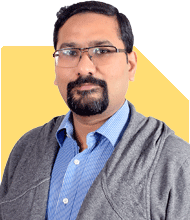42-Year-Old Master's Degree Holder Seeking Job Opportunities in Bangalore
Maxim Emmanuel |391 Answers |Ask -Follow
Soft Skills Trainer - Answered on Jun 16, 2024
An alumnus of the Xavier Institute of Management and Research, Mumbai, Maxim has over 30 years of experience in training young professionals and corporate organisations on how to improve soft skills and build interpersonal relationships through effective communication.
He also works with students and job aspirants offering career guidance, preparing them for job interviews and group discussions and teaching them how to make effective presentations.... more

Dear Sir/Mam, I am 42 years old. I work abroad in gulf as accountant. Being a women , I would to like to move to India due to my children education. Is there any possibility of getting jobs in Bangalore as I have applied 300+ jobs and not a single response from anyone. I am a master degree holder and loosing hopes of getting jobs. At any cost I would like to move.due to financial condition,I need a job once I move
If you are in the Gulf the Bangalore salaries may not be on par.
So, what's the financial condition because of no current job or higher expectations. Clarify and let me know!?
However if you need professional advice happy to assist!
https://m.me/maxim.emmanuel.2024
You may like to see similar questions and answers below
Mayank Rautela | Answer |Ask -Follow
HR Expert - Answered on Mar 11, 2022
Aashish Sood |115 Answers |Ask -Follow
CAT, Management Expert - Answered on Dec 01, 2023
Prof Suvasish Mukhopadhyay |293 Answers |Ask -Follow
Career Counsellor - Answered on Nov 12, 2024
Nayagam P P |4050 Answers |Ask -Follow
Career Counsellor - Answered on Jan 15, 2025
Nayagam P P |4050 Answers |Ask -Follow
Career Counsellor - Answered on Jan 15, 2025
Ravi Mittal |504 Answers |Ask -Follow
Dating, Relationships Expert - Answered on Jan 15, 2025
Ravi Mittal |504 Answers |Ask -Follow
Dating, Relationships Expert - Answered on Jan 15, 2025
Ravi Mittal |504 Answers |Ask -Follow
Dating, Relationships Expert - Answered on Jan 15, 2025
Ravi Mittal |504 Answers |Ask -Follow
Dating, Relationships Expert - Answered on Jan 15, 2025
Samraat Jadhav |2166 Answers |Ask -Follow
Stock Market Expert - Answered on Jan 15, 2025
Nayagam P P |4050 Answers |Ask -Follow
Career Counsellor - Answered on Jan 15, 2025
Nayagam P P |4050 Answers |Ask -Follow
Career Counsellor - Answered on Jan 15, 2025
Kanchan Rai |493 Answers |Ask -Follow
Relationships Expert, Mind Coach - Answered on Jan 15, 2025



























